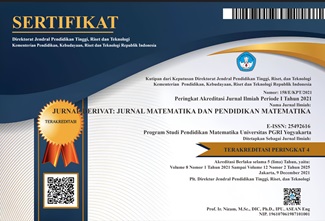Eksplorasi Etnomatematika Pada Benteng Belgica Di Neira Maluku Tengah
DOI:
https://doi.org/10.31316/j.derivat.v8i2.1635Abstract
Ethnomathematics is the study of mathematics learning. One of the cultural assets in Indonesia is Belgica Fort which is located on Neira Island, Central Maluku, which has a pentagon shape on the outside. The purpose of this research is to know the history of Belgica Fort and to know the construction of Belgica Fort building which is associated with mathematics in geometric shapes. The research method is a document analysis by analyzing and reducing data from several articles that become references, with the conclusion that the Belgica Fort building is composed of various forms of flat and spatial shapes. The results of his research that learning mathematics on geometry material associated with Belgica Fort can be used as teaching materials and encourage students to be active in exploring their knowledge through observations made in this ethnomathematics-based learning.
Â
Keywords: Fort Belgica, Ethnomathematics, GeometryReferences
Firdaus, B. A. B., Widodo, S. A., Taufiq, I., & Irfan, M. 2020. Studi Etnomatematika : Aktivitas Petani Padi Dusun Panggang. Jurnal Derivat. Vol 7 No 2. Desember. ISSN: 2549-2616.
Hardiati, S. 2017. “Etnomatematika: Aplikasi Bangun Datar Segiempat Pada Candi Muaro Jambiâ€. Aksioma. Vol. 8, No. 2, November 2017, e-ISSN 2579-764699.
Karim, M, A., & Hidayanto, E. 2014. Pendidikan Matematika II. Tangerang Selatan : Universitas Terbuka.
Khayat. 2020. “Etnomatematika: Bangun Datar pada Benteng Van Der Wijck Gombong Jawa Tengahâ€. UNION: Jurnal Pendidikan Matematika. Volume 8 No 1 Tahun 2020.
Nasyrullah, Rizki Sri. 2020. “Benteng Belgica: Bangunan Seribu Makna di Banda Nairaâ€. [Online] Tersedia: https://blog.atourin.com/destination/benteng-belgica-bangunan-seribu-makna-di-banda-neira/#:~:text=Di%20bagian%20tengah%20benteng%20terdapat,yang%20berada%20di%20tepi%20pantai[5 Mei 2021].
Ningsih, N., Hariyani, S., & Fayeldi, T. 2019. Analisis Kesalahan Siswa dalam Menyelesaikan Soal Lingkaran Berdasarkan Kategori Watson. UNION: Jurnal Pendidikan Matematika. Volume 7 No 2 Tahun 2019.
Purnomosidi, Safiroh, W., Gantiny, I. 2018. Buku Guru Senang Belajar Matematika. Jakarta: Kementrian Pendidikan dan Kebudayaan, 2018.
Rijali, A. 2018. Analisis Data Kualitatif. Jurnal Alhadharah. Vol. 17 No. 33.
Rosa, M., & Orey, D. C. (2011). Ethnomathematics : the cultural aspects of mathematics Etnomatemática : os aspectos culturais da matemática. Revista Latinoamericana de Etnomatematica. 4, 32–54.
Rosa, M., & Orey, D. C. (2013). Ethnomodeling as a Research Theoretical Framework on Ethnomathematics and Mathematical Modeling. Journal of Urban Mathematics Education. 6(2), 62–80.
Sari, M., & Asmendri. 2020. Penelitian Kepustakaan (Library Research) dalam Penelitian Pendidikan IPA. Jurnal Pendidikan Bidang IPA dan Pendidikan IPA. 6(1), 41-53.
Sarwoedi, S., Marinka, D. O., Febriani, P., & Wirne, I. N. 2018. Efektifitas Etnomatematika dalam Meningkatkan Kemampuan Pemahaman Matematika Siswa. Jurnal Pendidikan Matematika Raflesia. Vol. 03 No. 02, Desember 2018.
Sumiyati, W., Netriwati, N., Rakhmawati, R. 2018. Penggunaan Media Pembelajaran Geometri Berbasis Etnomatematika. Desimal: Jurnal Matematika, 1, 15-21.
Suharjana, A. 2008. Pengenalan Bangun Ruang dan Sifat- sifatnya di SD. Yogyakarta: Pustaka Pengembangan Pemberdayaaan Pendidikan dan Tenaga Kependidikan Matematika.
Downloads
Published
Issue
Section
Citation Check
License
Authors who publish with this journal agree to the following terms:
-
Authors retain copyright and grant the journal right of first publication with the work simultaneously licensed under a Creative Commons Attribution-ShareAlike 4.0 International License that allows others to share the work with an acknowledgment of the work's authorship and initial publication in this journal.
- Authors are able to enter into separate, additional contractual arrangements for the non-exclusive distribution of the journal's published version of the work (e.g., post it to an institutional repository or publish it in a book), with an acknowledgment of its initial publication in this journal.
- Authors are permitted and encouraged to post their work online (e.g., in institutional repositories or on their website) prior to and during the submission process, as it can lead to productive exchanges, as well as earlier and greater citation of published work (See The Effect of Open Access).







